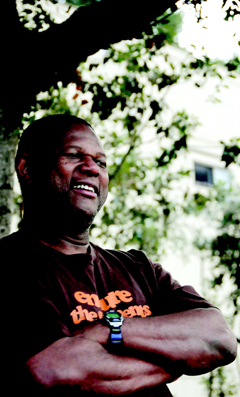 George Mumford
George Mumford
sports-psychology consultant for the Boston College men’s basketball team and LA Lakers meditation coach
Age: 59
Location: Newton Upper Falls, Massachusetts
How did you get into dharma?
I got into the practice via stressreduction, which was being taught by the HMO I was in. I had chronic pain and migraine headaches.
What’s exciting about Buddhism for you?
Learning about myself and being able to be more self-determined.
Is it relevant today?
It’s what Socrates said, “Know thyself.” Hasn’t changed.
What’s it like to be George Mumford?
If you look at where I am now versus where I was before I got into the dharma—I was in recovery, having pain and not being able to take pain medication; I was working in the military industrial complex. Now I’m very different—now I’m like everybody else out there: How do I make money and pay my bills, and at the same time evolve into the person I need to be? But that’s a moving target.
Do you subscribe to a particular lineage?
No.
Vegetarian?
I eat chicken and fish. I don’t do beef or pork.
All-time hero?
I want to get to the deathless state, so the Buddha and Jesus Christ. And Jimi Hendrix and Bruce Lee—they were the best at what they did and changed the world with their spirits. They had a way of self-expression that was original and magical.
You might be the most famous meditation teacher in the world that no one’s ever heard of—can you explain your line of work?
I don’t consider myself a meditation teacher. I help people be clear, do good, avoid evil, and train their minds.
Of the athletes you’ve worked with, who is the best meditator?
Michael Jordan was very coachable. He was the master of samadhi [concentration]. But he had it before I met him, so I can’t take credit for it—the rich get richer.
Did Jordan have the strongest concentration you ever witnessed?
Yeah, but it’s not just concentration. It’s mental toughness, and will to win. I study excellence, and I know that it doesn’t matter what domain a person who is excellent at what they do is in—there is always a meditative quality to their training and their performance. They may not train like you train at a monastery or at a retreat center, but certain qualities are there: right effort, wisdom, concentration, and faith or confidence.
I think we do ourselves a disservice when we predicate everything on this dualistic approach of sitting practice and then the rest of life. I think we’re limiting what meditation means. Dr. Dre says in one of his songs, “I got my mind on my money and my money on my mind”; whatever is on your mind, that’s your meditation.
What’s your best advice for young athletes wanting to get into meditation?
“I got my mind on my money and my money on my mind.” Meditation is a way of life.